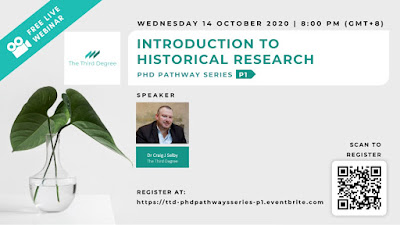WEBINAR | Introduction to Historical Research
In the early days of my postgraduate student journey, I was involved in two projects - one of them my own research; the other, being a research assistant for one of my supervisors, Gordon.
My own research required me to work in unusual conditions, especially for a novice researcher. I was undertaking business-embedded research in Singapore, and because I had to explore corporate history, found myself in the archives of not only the National University of Singapore Library, but also deep in the archives of the Singapore National Archives.
The NUS library was fantastic. A meticulous collection of texts, transcripts, manuscripts and working papers, along with a Newspaper Room - collating and curating newspaper clippings, but subject, by person, by company, from over half a century of publications. Armed with a discounted photocopy card, I spent days in the room, carefully filtering through the plethora of bound collections, identifying articles that informed the context of my research, and then copying and referencing them one-by-one.
Upon completion of information collection, I had nearly a thousand pages of photostat articles of Singapore corporate history, ready for me to digest, interpret, and weave connections with.
But the Singapore National Archives was a whole new world for this inexperienced research student. Not only was it beautiful, it has an extensive collection of manuscripts and transcribed oral histories related to the socio-economic transformation of Singapore. It was here in these oral history transcripts that I found what I needed; historic interviews with the patriarch of the Kwek Family, whom from which the Hong Leong corporate empire was grown.
These interviews were extensive, and exhaustive. Moreover, they were not in English. The full interview process - several days in total of interviews with the founding generations of Singapore - were recorded in written Chinese - something I had no experience of. Challenge number one was identifying which of these documents would inform my research; challenge number two being obtaining a reliable translation to work with.
The cavalry entered; a young library staff member who was generous enough with her time to listen to me explain my research and the type of information I sought, to then step me through the umpteen pages of transcribed oral history, translating the gist of the content, so that I could determine which pages I'd like to copy. In the end, I had about one hundred pages of Chinese writing copied, ready to take back and get a reliable translation of.
All up, a very good introduction, deep end style, into the basics of historical research. Not the full experience, but certainly an exploration into unknown depths at the time.
A slight pivot in my role at the University saw me as a research assistant to my supervisor for a specific project. The Globalisation of Movies, 1955 to 1995. My task was to extract information on cities and places represented in major movies in the 50s, 70s, and 90s, and to draw links between places represented and a possible globalisation trend within box office movie making.
How you may ask? Well, great question. Good, old fashioned, microfiche! Those machines that read minutarised camera film captures of documents (in this case, humongous numbers of newspapers), projected on to a sepia-toned screen (Google that, if you have to) no bigger than a typical tablet computer these days. Sifting through hundreds and hundreds of tiny slides of cinema advertisements, printing these to maintain a record, followed by meticulous categorisation and extraction of key information, then hitting the movie almanacs (again Google; also like Google, but in print form) to discern locations represented, then tallying data, drawing maps, and interpreting the findings - a deeper introduction to aspects of historical research.
That said, Historical Research is way wider in nature, but it can also have simple rookie experiences too. It's a wide world in research, and understanding historical research may prove beneficial at some stage of your research journey.
In our first PhD Pathways Webinar Series, I look forward to sharing with you stories of my experiences of undertaking Historical Research, but also sharing a broader introduction to the topic, the methodology, the challenges, and the cultural and temporal filters that may influence your interaction with the research.



Comments
Post a Comment